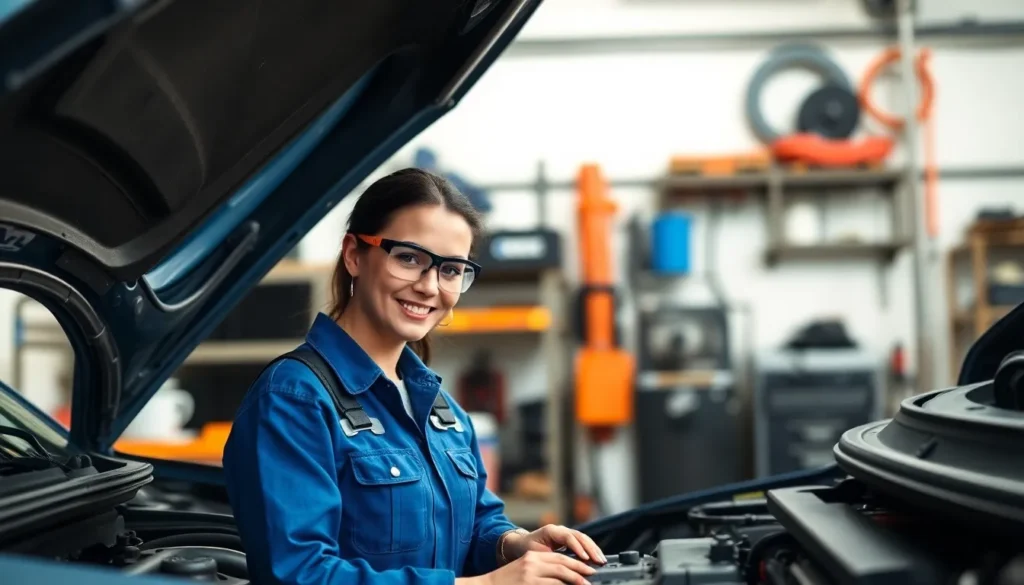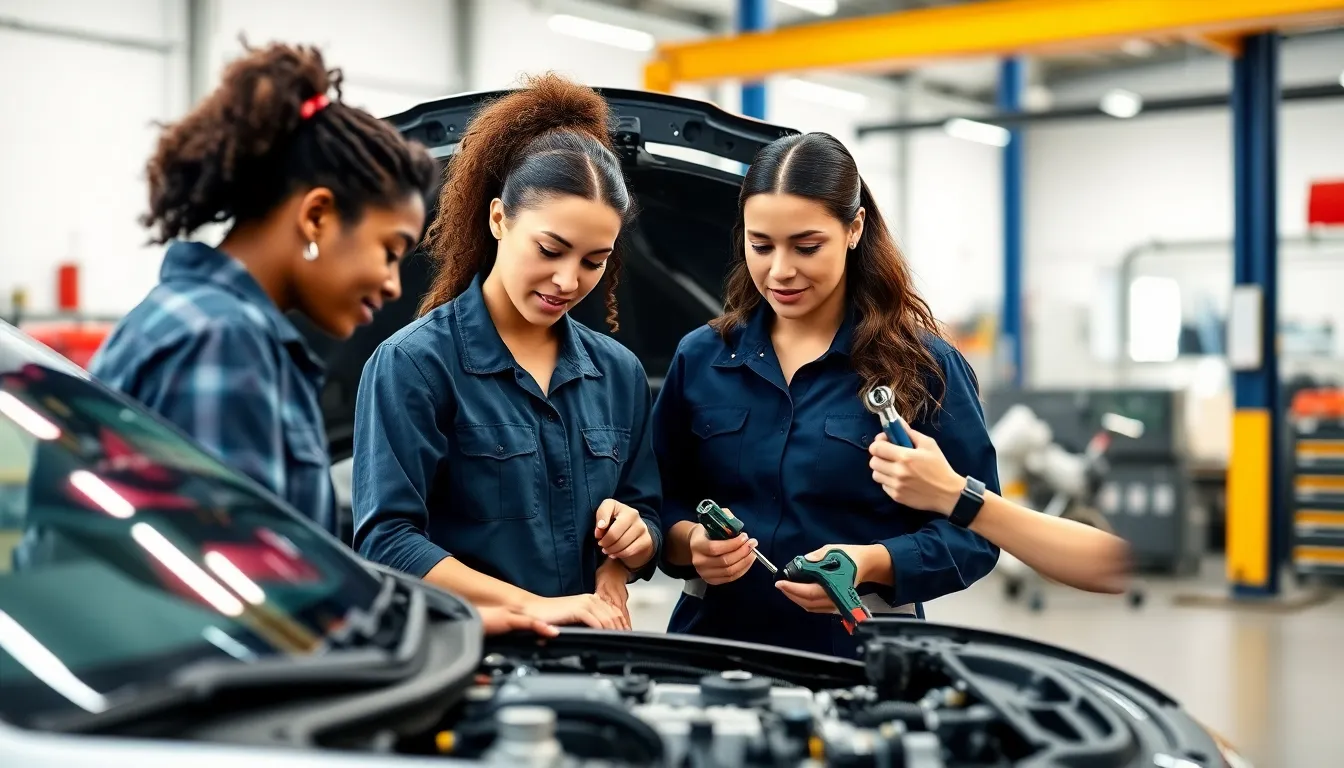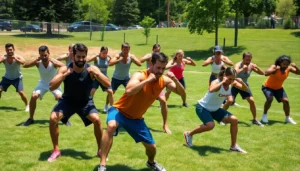
When you think of mechanics, images of grease-stained overalls and burly guys might spring to mind. But hold onto your toolboxes—female mechanics are breaking the mold and revving up the automotive world. These skilled women are not just changing oil; they’re changing perceptions, proving that expertise knows no gender.
Female Mechanics
Female mechanics are making significant strides in the automotive industry. These skilled women are not just mechanics; they’re also role models challenging outdated gender roles.
Historical Context
Historically, the automotive trade has been male-dominated, with women often relegated to supportive roles. During World War II, women entered the workforce to fill gaps left by men, working as mechanics and demonstrating their capabilities. Over the decades, their contributions increased visibility, leading to gradual acceptance within the profession. Notable female mechanics emerged in the 1970s, paving the way for future generations. Organizations like the Automotive Women’s Alliance Foundation formed to support women in the industry. These movements laid the groundwork for today’s female mechanics.
Current Landscape
The current landscape shows an increasing number of women entering mechanic programs and automotive repair shops. Statistics reveal that women comprise around 5% to 15% of mechanics, a number that continues to grow. Training programs designed specifically for women are becoming more prevalent, supporting their development. Female mechanics now work in diverse settings, from independent shops to dealerships. Many are also leveraging social media to showcase their skills and advocate for more representation. This shift not only benefits women but also enhances the industry’s overall diversity.
The Importance of Diversity in Mechanics

Diversity enhances the automotive industry by introducing various perspectives and skills. Female mechanics contribute unique problem-solving abilities that benefit overall operations.
Benefits to the Industry
Increased representation of women in mechanics promotes innovation. Studies indicate that diverse teams outperform homogeneous groups due to varied experiences and approaches. Female mechanics also attract a broader customer base, influencing business growth. Additionally, their presence helps challenge gender stereotypes, encouraging more girls to pursue careers in automotive fields. This shift fosters a more inclusive workplace, leading to improved teamwork and collaboration.
Challenges Faced by Female Mechanics
While progress is evident, female mechanics encounter various challenges. Gender bias remains prevalent in the industry, affecting hiring practices and workplace dynamics. Many women report feeling isolated in male-dominated environments, which can hinder career advancement. Access to mentorship and training opportunities often differs for women compared to their male counterparts. These obstacles can discourage talented individuals from remaining in the field. Addressing these challenges is essential for creating a more equitable automotive industry.
Training and Education Opportunities
Training and education opportunities for female mechanics have expanded significantly in recent years. Various programs aim to equip women with the skills needed to excel in automotive roles.
Notable Programs and Initiatives
Programs like Women in Automotive and the Automotive Women’s Alliance Foundation promote female participation in the field. Scholarships and workshops enhance learning experiences for aspiring female mechanics. Many community colleges now offer specialized courses that cater specifically to women, building their confidence and technical skills. Additional initiatives, such as hands-on training workshops and mentorship workshops, provide practical experience, allowing women to connect theory with real-world applications.
Role of Mentorship
Mentorship plays a pivotal role in the development of female mechanics. Access to experienced female mechanics helps build skills and offers guidance on navigating male-dominated workplaces. Formal mentorship programs foster connections between novice mechanics and seasoned professionals, enhancing learning opportunities. Peer mentoring also thrives within the community, creating supportive networks that empower women to thrive in the industry. Female mechanics frequently share their experiences on social media, inspiring others and promoting mentorship as a vital resource for professional growth.
Success Stories of Female Mechanics
Women are making significant strides in the automotive industry, achieving remarkable success as mechanics. Their contributions highlight a shift in traditional perceptions, showcasing talent and expertise unmatched by gender.
Highlighting Pioneers
Trailblazers like E.J. Smith emerged in the 1970s, breaking barriers in a male-dominated field. These pioneers not only paved the way for future generations but also demonstrated that women could excel in technical roles. Additionally, pioneers like Mary Barra changed the landscape of the automotive industry, proving leadership and mechanical skills are not defined by gender. Their legacies inspire current and aspiring female mechanics to pursue their dreams.
Contemporary Figures Making an Impact
Today, numerous female mechanics are reshaping the industry. Figures like Kasey B. and Michelle B. actively demonstrate their talents through social media, gaining followers and advocating for representation. Increasing numbers of women are joining mechanic programs and earning certifications. Organizations such as Women in Automotive spotlight successful female mechanics, showcasing achievements and fostering networks. Each of these women contributes unique perspectives and skills that enhance automotive service, proving that the future is bright for female mechanics.
The Future of Female Mechanics
The future for female mechanics is promising as they gain recognition and reshape the industry landscape. Emerging trends showcase a growing acceptance of women in technical roles, highlighting the importance of diverse perspectives in automotive repair.
Emerging Trends
Innovations like online training platforms enable female mechanics to access educational resources from anywhere. Increased visibility through social media allows women like Kasey B. and Michelle B. to share their skills and experiences. This visibility enhances recruitment initiatives aimed at attracting more females into the field. Statistics indicate a rise in female enrollment in mechanic programs, moving from 5% to potentially 20% within a decade. Furthermore, companies increasingly recognize the benefits of diverse teams, driving competition for female talent in the workforce.
Strategies for Increased Inclusion
Institutions implement targeted mentorship programs connecting beginners with seasoned professionals to facilitate knowledge sharing. Community colleges extend scholarships specifically for women to encourage enrollment in automotive courses. Workshops focusing on technical skills foster confidence and competence among aspiring female mechanics. Employers also adopt inclusive hiring practices to create supportive environments where women thrive. Engagement in professional organizations furthers the outreach, helping to build networks among female mechanics. With ongoing efforts, the automotive industry works toward a more equitable future for all individuals.
Conclusion
The rise of female mechanics marks a significant shift in the automotive industry. As more women enter this traditionally male-dominated field they’re not just breaking stereotypes but also enhancing the industry with their unique skills and perspectives. The ongoing support from training programs and mentorship initiatives is crucial for fostering this change.
With the increasing visibility of female mechanics through social media and community efforts the future looks bright. The automotive landscape is evolving into a more inclusive environment where diverse talent thrives. As the number of women in mechanics continues to grow the industry stands to benefit from their innovative approaches and problem-solving abilities.







